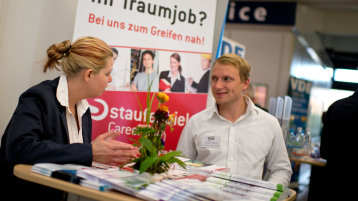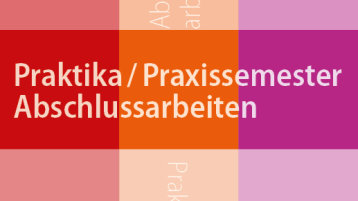Working for international students

Taking on a part-time job while studying has many benefits: you can make some extra money, gain valuable work experience, and make initial career contacts. Additionally, you will gain exciting insights into everyday working life in Germany. Make the most of this opportunity to prepare yourself for your professional future!
Jump to
Working during your studies: your rights and responsibilities
Information
The German Academic Exchange Service (DAAD) as well as the German National Association for Student Affairs provides detailed information on working in Germany:
During their studies or preparatory language courses, all international students generally have the right to take on a part-time job in Germany. However, different regulations apply to citizens of the European Union (EU) compared to non-EU citizens:
Nationals of the member states of the European Union, the European Economic Area (EEA) – i.e., Norway, Iceland, and Liechtenstein – as well as Switzerland
are treated equally to German nationals on the labor market. This means that students from these countries have the same access to the labor market as German students and can work as much as they want without permission from the authorities. Please note, however, the impact on your health insurance.
International students with a residence permit according to §16b of the Residence Act
are allowed to work a maximum of 140 full days per year. This also includes voluntary internships. The immigration office will document this amount of work on the supplementary sheet to your residence permit.
The regulation introduced as of March 1, 2024, is legally binding.
This means that even if your visa or residence permit states 120 days, you are allowed to work for 140 days. You do not have to have the supplementary provision changed at the immigration office.
Working Hours Regulation
The 140 days are referred to as your working day account and can be filled with half days. The option that is most beneficial for you is always calculated:
Variant 1.)
up to four hours a day may be counted for the working day account as half a working day and more than 4 hours as a full working day or,
Variant 2.a.)
During the lecture period: you can work up to 20 hours a week, regardless of how you distribute the hours. These are then calculated as 2.5 days on your working day account.
Variant 2.b.)
Outside of the lecture period: without restriction, even if more than 20 hours (e.g., to full-time work of 40 hours), only 2.5 days are counted
-
Example: Working 4 x 5 hours per week would be 4 full workdays according to variant 1, but only 2.5 workdays according to variant 2
-
Vacation days and sick days are not counted towards your working day account.
-
You and your employer are responsible for complying with the limit on your working day account.
-
If you wish to work more than the allowed number of working days, you need the approval of the immigration office.
-
Fee-based work, including as a freelancer or self-employed person must be approved by the immigration office. To increase your chances of obtaining approval, you should also adhere to the 140 full days and to the 20h per week during the lecture period to avoid jeopardizing your studies
Exceptions:
- Student jobs are allowed without restriction and include activities at universities, research institutions, student unions, student councils (ASten), and university communities.
- Even if you are completing a compulsory internship required for your studies, you may exceed the 140-day limit.
- You may also undertake these jobs in addition to the part-time jobs described above – as long as they do not jeopardize your studies.
Finding a part-time job
Whether as a working student, student assistant, or waiter: part-time jobs offer you the opportunity to finance part of your studies and meet new people. Ideally, you can also gain relevant work experience, which can make it easier for you to start your career later on. For both part-time and graduate jobs, you can find suitable offers and create your personal application profile on the Career Service's job portal.
You can also find numerous job offers for students on the job portal of the University of Cologne.
Ready, Study, Go - Your Path to the German Job Market
The "Ready, Study, Go" project at TH Köln was specifically developed to support international students throughout their studies and make it easier for them to enter the German job market. Our goal is to offer you the best conditions for a successful career start through practical qualification offers and targeted networking with companies.
Whether you have questions about financing your studies, need support with the application process, or want to establish networks with potential employers – we offer you a comprehensive range of services to prepare you for your professional future in Germany.
The Career Service also offers comprehensive advice and targeted information events on all aspects of your career.
Taxes
If you want to work in Germany, you need a tax identification number (tax ID). You will automatically receive this by post a few weeks after registering your place of residence.
If you do not know your number, you can request it to be reissued to you. This is only possible by post and can take up to 4 weeks.
You only have to pay income tax in Germany if your income is above the tax-free limit (also known as the basic personal allowance: €12,096 per year in 2025). The income tax return is used to calculate how much tax you have to pay.
You must file an income tax return if you are self-employed or if you earn more than the tax-free threshold. If your employer automatically deducts tax from your salary, you may want to file a tax return, especially if your income is below the basic personal allowance. You can get the excess tax back in the following year.
Self-employed persons usually have to pay income tax retrospectively for one year to the tax office if their income exceeds the basic personal allowance. It is therefore advisable to set money aside to be able to pay the tax.
Social Security Contributions
If you work in Germany, you generally have to pay social insurance. Social insurance in Germany comprises five types of insurance:
- Health insurance: It helps cover the costs of medical treatment or hospital stays if a person becomes ill.
- Long-term care insurance: It helps cover the costs if a person is old or ill and needs assistance in daily life.
- Unemployment insurance: It provides financial support for a period if someone loses their job through no fault of their own until they find a new one.
- Pension insurance: It provides a monthly income to people after retirement.
- Accident insurance: It assists with recovery and covers necessary treatments if an accident happens during working hours or on the way to or from work. Accident insurance is always provided through the employer.
Not all jobs are subject to social insurance to the same extent.
- Mini-Job: In this job, you earn a maximum of EUR 556 per month (EUR 603 per month as of 2026). Students are exempt from health, long-term care and unemployment insurance - this means you can remain in the student health insurance scheme. Students are subject to compulsory pension insurance, but can apply for exemption from compulsory pension insurance if they want to save their own contribution. Your employer will inform you about this.Such an exemption is only recommended for international students who wish to return to their country of origin and cannot take their pension entitlements with them to their country of origin on the basis of a social security agreement.
- Short-term employment: This type of employment can last a maximum of three months or 70 workdays in the calendar year and must be limited to these periods from the start (e.g., working at a Christmas market, seasonal harvest work). Students are exempt from health, long-term care, pension and unemployment insurance - this means that you can remain in the student health insurance scheme.
- Working students: A working student works for a company on a long-term basis, earns more than EUR 556 per month and studies must take priority over work. Maximum working hours per week are 20 hours. Students are exempt from health, long-term care and unemployment insurance if they do not work more than 20 hours per week. Students are subject to compulsory pension insurance.
Employment rights in Germany
It is important to know your employment rights in Germany in order to feel safe and treated fairly in the workplace. Regardless of your nationality or residence status, here are the most important rights you are entitled to:
- Employment contract: Everyone has the right to a written employment contract that sets out the main terms of employment, such as working hours, salary, vacation, and termination notice periods.
- Regulated working hours: There are laws that regulate how long a person may work. As a rule, it is no more than 8 hours per day, and you are entitled to breaks and rest periods. You are also not allowed to work more than 48 hours per week.
- Minimum wage: Every employer must pay the statutory minimum wage as an absolute minimum. The current statutory minimum wage is EUR 12.41 gross per hour. It will increase to EUR 12.82 gross per hour starting January 1, 2025.
- Vacation: Every employee has the right to paid vacation. Typically, this is at least 24 working days per year for a 6-day workweek. For a 5-day workweek, it is a minimum of 20 days. Even mini-jobbers are entitled to annual leave, and its scope is determined in the employment contract.
- Paid public holidays: If a regular working day falls on a public holiday, the employee is entitled to paid leave.
- Illness: If an employee falls ill, they have the right to receive their full salary for up to 6 weeks. After that, the health insurance company pays sick pay. A medical certificate is required.
- Illness of a child: If a child under the age of 12 who lives in the household and has statutory health insurance falls ill, each parent can take up to 15 days (single parents up to 30 days) unpaid leave per year. There are extended regulations if there are several children. The statutory health insurance can pay Children’s sick pay on application.
- Caregiver leave: Employees are entitled to up to 10 days unpaid leave to organize the care of a close relative in an acute care situation. Care support allowance can be applied for via the insurance company of the person requiring care.
- Leave of absence for important personal reasons: Employees* can request unpaid leave in certain situations, e.g. to care for a child if the regular caregiver is unavailable.
- Protection against dismissal: There are rules on how and when an employer may dismiss an employee. Normally, a certain notice period must be observed (often 4 weeks to the 15th or end of a month) and the termination must be for a specific reason.
- Occupational safety: The employer must ensure that the workplace is safe and free from health hazards. This also includes free safety equipment and training.
- Equal treatment: The General Equal Treatment Act (AGG) prohibits discrimination of any kind during the recruitment process and in the workplace based on race, ethnic origin, gender, religion or belief, disability, age or sexual identity. In the event of discrimination, it is advisable to seek legal assistance.
- Maternity protection and parental leave: Pregnant women and mothers have special protection, including specific regulations regarding working hours and protection from dismissal. Parents can take parental leave after giving birth without the risk of termination.
Working after your studies
Residence Permit for Job-Seeking
As an international graduate from a German university, you have numerous opportunities to find a job in Germany.
EU citizens enjoy the same rights as German nationals and thus have unrestricted access to the German labor market.
Graduates from all other countries have 18 months after the completion of their studies to find a qualified job. In order to finance the time spent looking for a job, international graduates are allowed to pursue part-time jobs without restriction during these 18 months.
Residence Permit for Gainful Employment
Once you have found a qualified job, you need to contact the immigration office to apply for a residence permit for gainful employment. There are various options available to you. Please visit "Visa and Residence Permit" as well as "Make it in Germany – the German government’s portal for skilled workers from around the world" to find out about your options.





